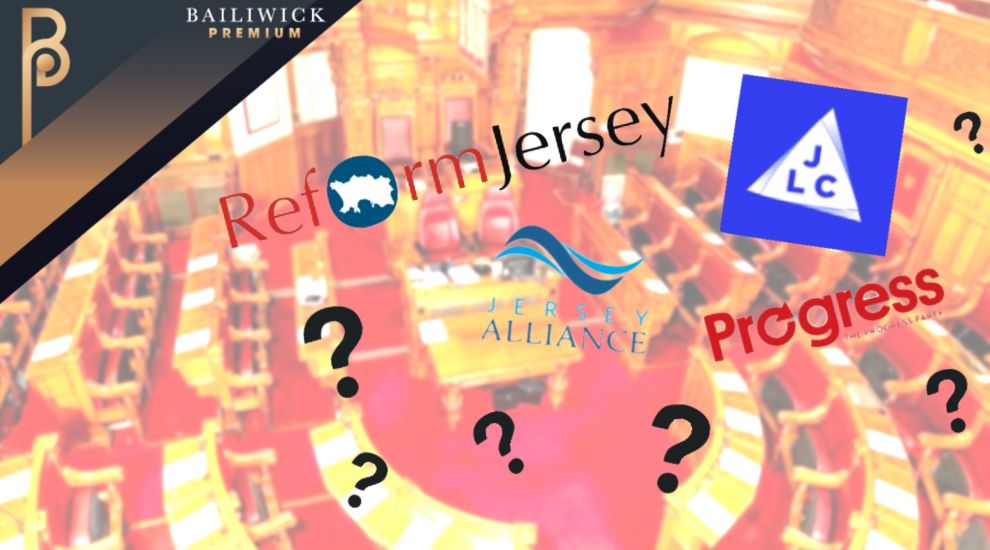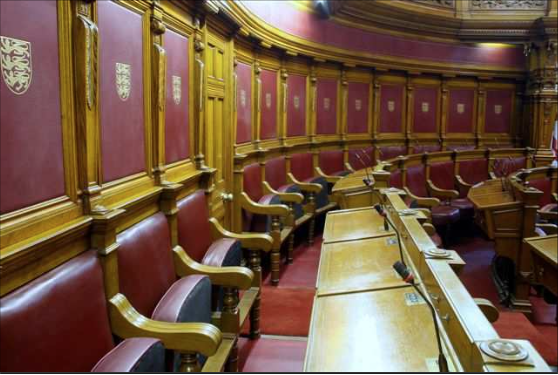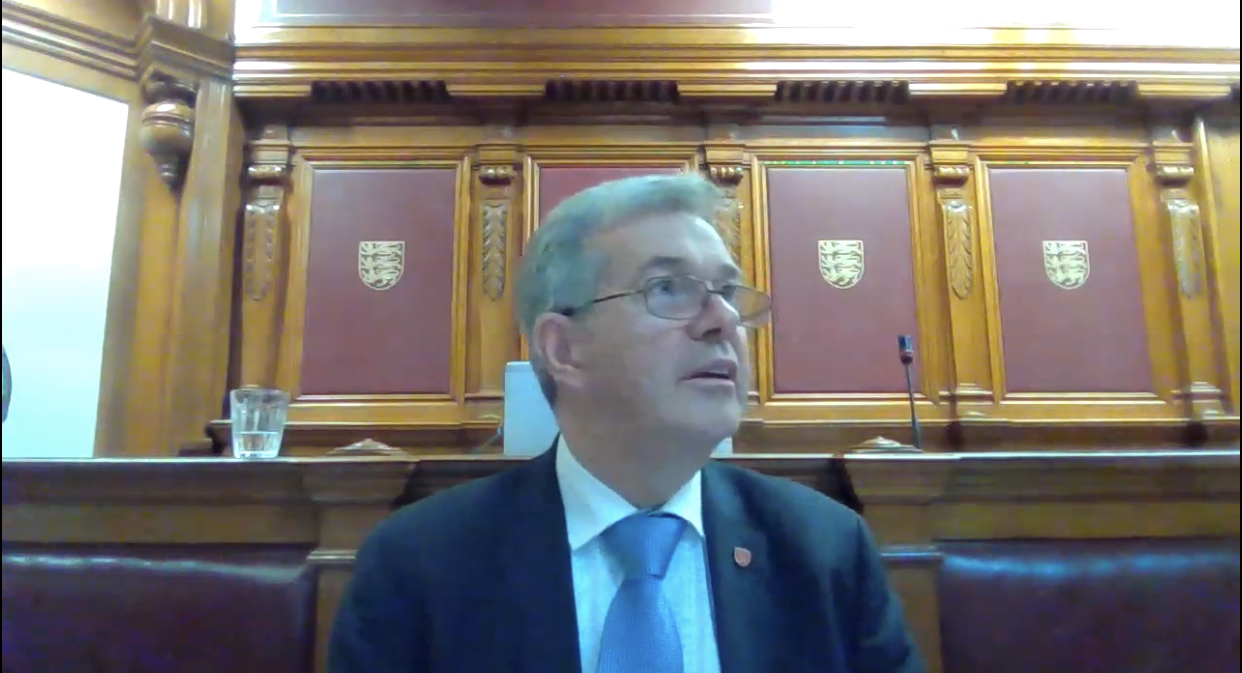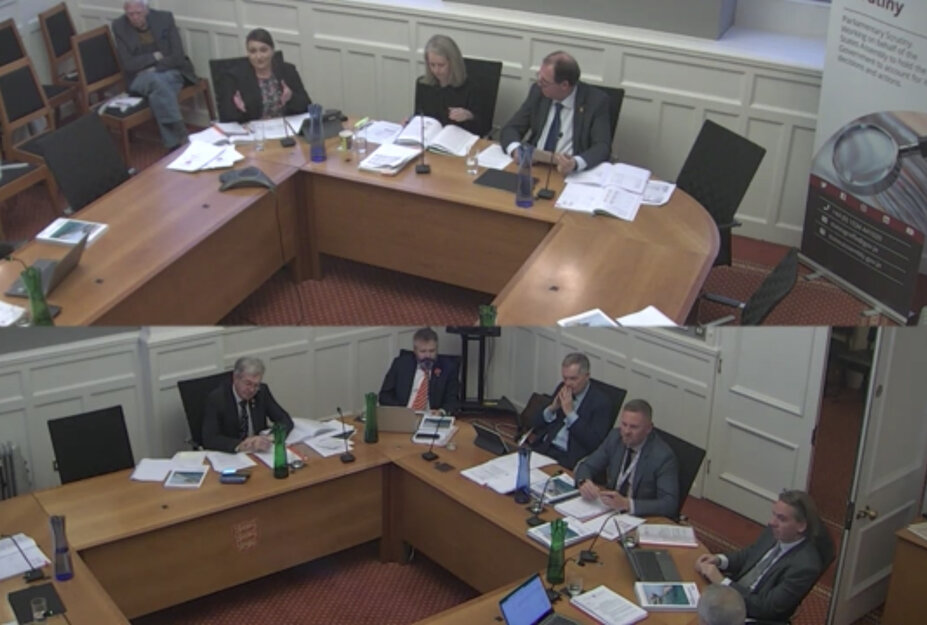


Parties look set to be in full swing by the election in 2022... But are the rules and processes of the States Assembly really ready? And will meetings start to look more like PMQs? Express investigates.
Although Reform has been an official party represented in the States since 2014, there is a distinct possibility that the next Assembly will have at least two more.
With the Progress Party and Jersey Alliance already officially registered, and the Liberal Conservatives looking likely to form a party, the political landscape looks set to shift, if voters support their candidates.
But after many years of independent politicians, there are questions over whether the rules that govern States Members' activities are fit for purpose.
Say, for instance, a Progress backbencher is chair of a panel scrutinising the work of a Progress minister? Could party allegiance trump proper review?
And, at the moment, it takes seven States Members’ signatures to force a States debate, as Deputy Rob Ward did over closing schools early last Christmas. But what if a party has seven Members? They could ‘requisition’ meetings whenever they wanted.
And should party leaders have special privileges to ask questions of the Chief Minister in sittings, as official Opposition party leaders do at Westminster?

Pictured: Should parties sit together in the States Chamber? And who should decide?
The process of finding answers to these questions – and many more – began last January, when Members passed a proposition asking the Privileges and Procedures Committee (PPC), which oversees States business, to see how Standing Orders might be changed with the advent of multiple political parties.
PPC then commissioned a group of four UK-based academics to investigate. Dr Caroline Morris from Queen Mary University of London, Dr Matthew Bishop form the University of Sheffield and Professor Jack Corbett, University of Southampton, who are all belong to the Centre for Small States, worked in collaboration with Paul Evans CBE to undertake the research project.
Their £16,140 report – which draws on comparisons with many other small states from Samoa and Vanuatu to New Zealand and Kiribati - has just been published, which makes a number of recommendations.
PPC will now set up a sub-committee in order to consider the report in more detail and determine what areas to prioritise for implementation.
The group argues that, before making any recommendation, the Assembly needs to agree on the definition of a party. In fact, their first suggestion is that the word “party” isn’t used at all in Standing Orders.
The group propose that rather than using “party” as the technical term in the Standing Orders, the expression “political group” should be used. This, they argue, allows for flexibility in the application of the rules while allowing parties to “self-identify”, even if they do not meet the criteria for recognition, without confusing the issue.
The academics say that a key decision to be made by the Assembly is about the minimum number of elected members which would be required for recognition in the rules.
They argue that defining how many people make up a ‘political group’ is “probably an essential first step” to making their proposals workable.
They recommend: “The history of political party representation in the States, and the relative size of the parliament, suggests that between two and four members would be an appropriate minimum number for recognition in the Standing Orders.
Currently, the States elect the Chief Minister and Council of Ministers, and the Chief Minister has to accept the Assembly’s decision on the latter even if they were not his or her preferred candidates.
The report recognises that the arrival of parties is likely to introduce new incentives, and conflicts, around how these positions are filled.

Pictured: Should the Chief Minister be allowed to select his or her own ministerial team?
It explains: “Dominant parties might be able to achieve their preferred ministerial appointments, but weaker ones might not even if they are the party of the Chief Minister. A development of this nature has potential to disrupt the smooth functioning of government.”
While the report does not suggest radical change to how a Chief Minister is elected, it does recognise that the current way ministers are chosen could cause an issue in a party-heavy States Assembly.
“The most radical option would be to end the process of approval of ministerial appointments by the States and leave it wholly to the Chief Minister’s discretion,” it says. “This could either be by total silence on the question or by a declaration - whether embodied in the Standing Orders or just by resolution - that the Chief Minister will appoint the designated list of ministers from among the elected members.”
The next radical option, the report suggests, would be to follow the Scottish Parliament in having a Standing Order that says only the Chief Minister can nominate ministers and the each person on his or her list is then voted on by the Assembly.
The report recommends that PPC should consider setting up of some form of ‘Bureau’ or ‘Business Committee’ within the States.
These are a very common feature in other jurisdictions and usually consist of party representatives and backbenchers, usually under the chairmanship of the presiding officer, and have the main task of agreeing the forthcoming agenda of the body and presenting it to the assembly for adoption.
The authors suggest: “A key task that it could take on in addition to agenda negotiations is bringing forward nominations for committee and panel positions in a way which reflects the party composition of the States as a whole.
“We consider then that the establishment of a bureau-style body in the States could be the elegant solution to managing the potential tensions which may arise if parties begin to displace the dominance of independents in its membership, or even if they simply have to seek a way of co-existing.
“It would also offer a means of enabling the executive to have some guarantee that its business would at least be brought forward in a timely way for decision in the plenary, while ensuring that other voices were heard and alternative agenda given their chance to be tested in a vote.
“An effective bureau could also provide a degree of protection of the independent status of the presiding officer and Greffier.”
Again, this is one for the ‘Bureau’, the report recommends.
Setting out why this issue is relevant, the group explains: “If parties in Jersey form along traditional lines, that is to advance a particular programme, they are likely to seek avenues for promoting their programme in various parliamentary contexts.
“One of these is that of committees and scrutiny panels. They may also wish to use these fora to present themselves to the Jersey electorate as a credible government, or government-in-waiting.
“The States is therefore likely to come under pressure to provide opportunities for parties to advance their policy goals and electoral profile via committee and panel membership and the high-profile role of Chair.”

Pictured: The report says that Scrutiny Panel members should be chosen by a cross-party 'Bureau'.
The report concedes that finding a solution which might work for the States is hampered by the absence of any body equivalent to a Bureau or Committee of Selection in which nominations could be filtered for proportionality before being put to the plenary for endorsement.
Therefore, it again recommends that a Bureau is established.
It says: “While a fully-fledged Bureau may seem a premature development for the States, it could be that a system along these lines would in fact provide a flexible and adaptable instrument to guide the States through any increase in party representation amongst its elected members.
“While independents remain in a majority, devising rules for its composition would be a challenge, but if there were trust and a willingness to make it work it could be an efficient way to manage the business of the States and accommodate to the emerging executive/legislature arrangements.”
These less pressing issues include: should a party leader be able to vote by proxy for partly members in their absence? Should parties sit together in the Assembly? And, should there be a recognised ‘Opposition’?
The report suggests that PPC give these matter consideration once the main matters are dealt with.
It concludes: “There exist a wide range of examples from around the world - from both small states which echo Jersey’s size and scale to overseas territories which have a similar political inheritance, and even larger British polities with similar political DNA - on which Members might draw for inspiration.
“As they undertake this work, we believe that there are some ‘high priority’ and ‘lower priority’ tasks.
“In the case of the former, we recommend that a conversation is initiated rapidly around how the Standing Orders might be revised in terms of defining and recognising a party, along with those pertaining to the appointment of a Chief Minister and the composition of committees.
“This is especially important given the evident conflicts that could emerge - in terms of governing legitimacy - if large numbers of Independent Members come to coexist with those representing parties.
“The latter, which is equally important, but of less immediate concern, is the need to consider the Standing Orders that relate to voting and seating arrangements, but we consider that these can be developed over time according to how political conventions evolve.
“To help with this endeavour, they might also be kept under constant review by the Privileges and Procedures Committee and made an ongoing topic of political deliberation, so that all actors have buy-in to ensuring party development occurs alongside - and, crucially, is seen to occur in ways that facilitate good bipartisan democratic practice, rather than being operationalised for factional advantage.
“In that sense, it is very much a means to an end rather than an end in itself.”

Pictured: The academics warn that it is ultimately up to the people of Jersey to prevent the unhealthy dominance of one interest or party.
The group also has a strong warning to everyone involved in politics in Jersey; words of caution that drill down to the very foundations of the island’s democracy.
They say: “No procedural safeguards are likely long to survive contact with a culture where those with power fail to exercise self-restraint, where respect is not accorded to alternative and minority views, where partisanship always trumps consensus, or where the key actors have lost sight of the essential truth that democracy is about enabling the peaceful transfer of power from one group to another in accordance with the views of the electorate.
“The States collectively, and elected members individually, along with the wider civil society of Jersey, must bear responsibility for exercising the vigilance required to ensure the political culture remains open, tolerant and fair.”
Comments
Comments on this story express the views of the commentator only, not Bailiwick Publishing. We are unable to guarantee the accuracy of any of those comments.